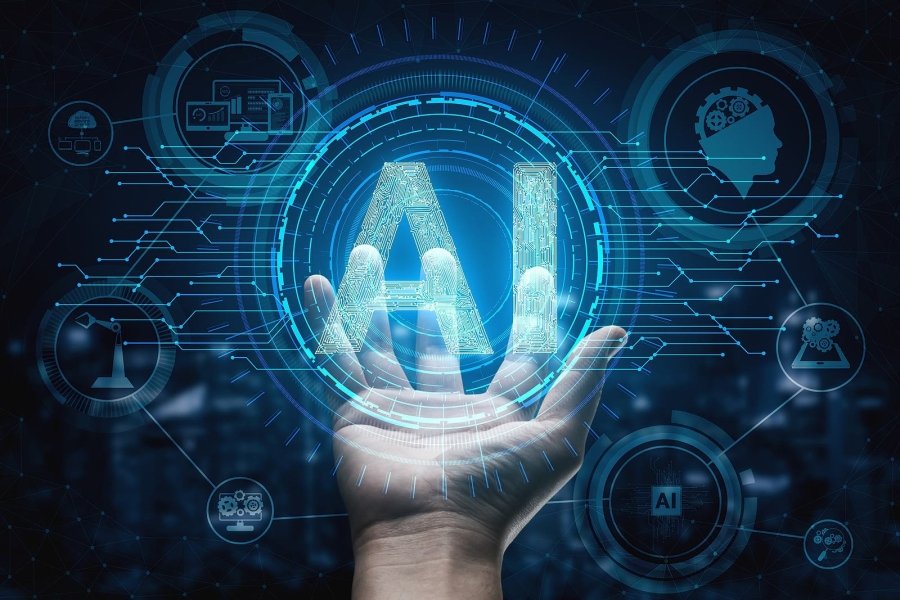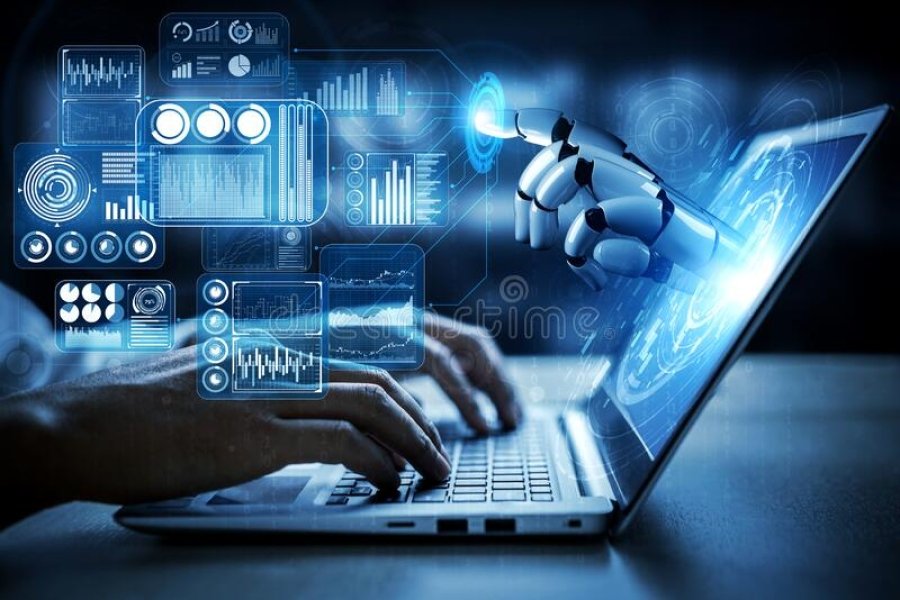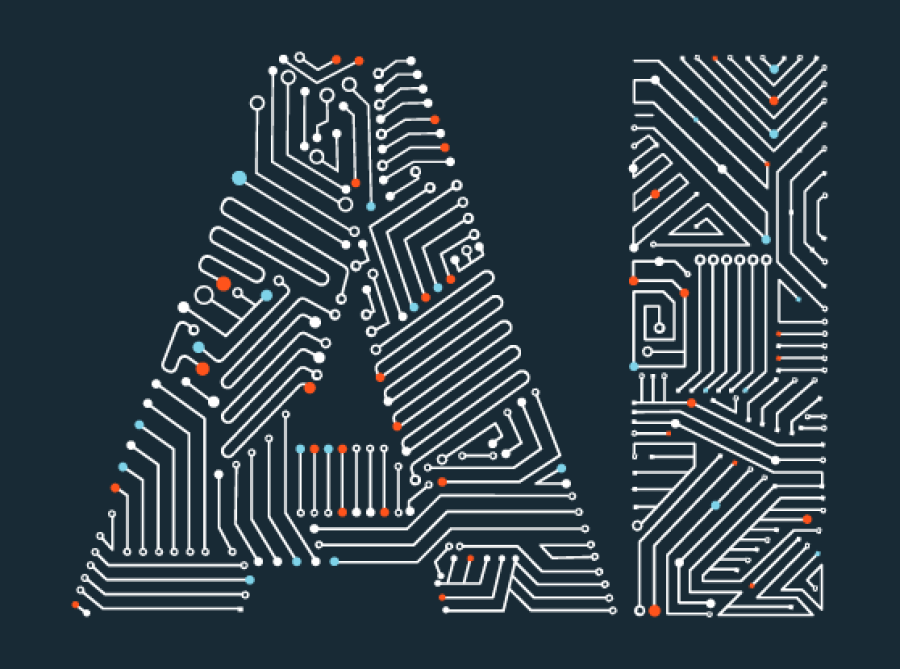What is AI?
What is artificial intelligence?
Artificial Intelligence (AI) is a broad branch of computer science that deals with the creation of intelligent machines that can perform tasks based on human intelligence. While artificial intelligence
is an interdisciplinary science, advances in machine learning and especially deep learning have led to
changes in almost all business areas of printing technology.
Artificial Intelligence allows machines to act or enhance human thinking ability as well. From the
development of self driving cars to the advent of personal assistants like Siri and Alexa, artificial
intelligence has become a part of everyday life, and companies in all areas, all businesses invest
in space.
ARTIFICIAL INTELLIGENCE DEFINITION: BASICS OF AI:
Understanding AI
In general, intelligent machines can perform tasks normally associated with human intelligence,
such as interpreting, playing games, and recognizing patterns. They often learn how to do this
by studying big data, looking for patterns they can model in their own decisions. Overall,
people will be interested in AI learning, encouraging good decisions and preventing bad ones.
But some AI systems are designed to learn without supervision - for example, by playing video
games over and over until you learn the rules and how to win.
Strong AI
Strong AI, also known as artificial intelligence, is a machine that can solve problems it was not trained to do, just like humans. This is the kind of AI we see in movies like the droids in Westworld or the data
characters in Star Trek: The Next Generation. This kind of intelligence does not yet exist.
Creating a machine with human intelligence that can be used for any task is the holy grail of many AI esearchers, but the search for general intelligence has become problematic. Some argue that
strong AI esearch should be limited due to the risk of developing powerful AI without appropriate
safeguards.
Compared to a weak AI, a strong AI represents a machine with all cognitive processes – and
more equalto the user but time has not diminished the complexity of achieving this feat.
Machine Learning vs. Deep Learning
While the terms "machine learning" and "deep learning" are often included in discussions about
artificial intelligence, they should not be used interchangeably. Deep learning is a type of machine
learning, which is a subfield of artificial intelligence.
Machine learning
Machine learning algorithms take data from a computer and use statistical methods to help it
"learn" how to succeed in a task specifically programmed for that job. Instead, machine learning
algorithms use historical data as input to predict the resulting outcomes. To this end, machine
learning includes supervised learning (where the need for input is known because of the r
ecording data) and unsupervised learning (where the need is unknown due to the use of
anonymous files).
Deep Learning
Deep Learning is a type of machine learning that drives ideas by motivating neural network
architectures. A neural network consists of many layers that are hidden from processed data,
allowing the machine to learn "in-depth", make connections and weight objects for good
results.
The Four Types of Artificial Intelligence
Artificial Intelligence can be divided into four groups according to the type and complexity of the
tasks the machine can perform. These are:
Reactive Machine
Finite Memory
Theory of Mind
Self Awareness
Reactive Machines
Reactive Machines, as the name suggests, follow AI principles that can only be used in its own
way.Feeling pain. The world before it. Reactive systems cannot store memory and therefore
cannot rely on the past to make real-time decisions.
A direct understanding of the world means that reactive systems are designed to perform only
certain tasks. However, there are benefits to deliberately reducing the worldview of machine
response: This type of AI will be more reliable and trustworthy, and will always respond to the
same emotions.
Reactive Machine Example The
Deep Blue is a chess supercomputer developed by IBM in 1990 that beat chess master Garry
Kasparov in one match. Deep Blue can only recognize the chess pieces on the board, it
knows how each chess piece moves according to the chess rules, knows exactly the current
position of each chess piece and can determine the best strategy. The computer does not follow
the opponent's nextmove and does not try to put itself in a better position. Each turn is seen as its
own reality, separate from other previous movements.
Google's AlphaGo also cannot evaluate the next move, instead relying on its own neural network
to evaluate the current game, giving Deep Blue the advantage in many difficult games. AlphaGo
also won first-class Go champion Lee Sedol in 2016.
Theory of Mind
Theory of mind is a theory. We have yet to develop the skills and research necessary to reach the
next level of intelligence.
This idea is based on the psychological theory of understanding that other animals have feelings
and thoughts that influence their behavior. In terms of AI technology, this means that AI can
understand how humans, animals, and other machines think and make decisions through
self-reflection and decision - making, and then use that information to make their own decisions.
Essentially, machines must be able to understand and process "mind" content, mind changes in
decision making, and other mental processes in real time and create a relationship between
humans and AI.
Self-Awareness
When a theory of mind can be developed at some point in the future of artificial intelligence, the final
step will be for the artificial intelligence to become self-aware. This intelligence has a human level
awareness of the existence and emotions of others as well as itself in the world. He will be able to
understand what other people want, not only what to communicate with them, but also how to
communicate.
Self awareness in AI is about both human scientists understanding the field of consciousness and learning
to reprogram consciousness to turn it into a machine.
Artificial Intelligence Examples
AI technology comes in many forms, from chatbots to navigation apps to wearable fitness trackers.
The examples below show the scope of AI applications.
ChatGPT
ChatGPT is an AI chatbot that can generate various types of content, from letters to answers to simple
questions. Released by OpenAI in November 2022, ChatGPT is powered by a major language model
that makes it look like human script.
Google Maps
Google Maps uses location data from smartphones to monitor traffic tides and measure the fastest
routes, as well as information such as user reports on construction and traffic accidents.
Smart Assistants
Personal assistants such as Siri, Alexa, and Cortana use natural language processing (NLP) to receive i
nstructions from users to set alerts, search for information online, and control lights in people's homes.
Overall, these assistants are designed to learn about customer preferences and improve their
experience over time with better recommendations and more responsive responses.
Snapchat Filter The
Snapchat Filter uses machine learning algorithms to recognize the difference and background of images,
track facial movements and adjust the image on the screen according to the user's actions.
Self-Driving Cars
Self-Driving Cars are a good example of deep learning because they can detect objects around them,
determine their distance from other cars, be aware of traffic signals, etc. They use deep neural
networks for
Wearable Devices
Wearable sensors and devices used in the medical industry use deep learning to measure patients'
health, including blood glucose, blood pressure, and heart rate. They can also take samples from
the patient's previous medical records and use this to predict future illnesses.
MuZero
MuZero is a computer program developed by DeepMind, which is a promising front line in achieving
true artificial intelligence. He learned by brute force games he was never taught to play, including chess
and all of the Atari games that have been played millions of times.
Benefits of Artificial Intelligence
AI has many uses, from developing vaccines to providing fraud detection. According to CB
Insights research, AI companies will generate $66.8 billion in revenue in 2022, more than double
the revenue in 2020. Artificial intelligence is making waves in many industries due to its rapid
adoption.
Safer Banking
Business Insider Intelligence's 2022 Research on Artificial Intelligence in Finance found that more
than half of financial services firms already use AI solutions for risk management and revenue.
Using artificial intelligence in business can save over $400 billion. According to Best Medicine. Medicine, the 2021 World Health Organization stated that integrating AI into healthcare poses
challenges, but "shows great promise" because of the benefits Urine technology can provide, such
as smarter health policy and improved accuracy in diagnosis. patients.
Innovative Media
Artificial intelligence also appears in the field of entertainment. According to Grand View Research,
the global AI market in media and entertainment is expected to grow from $10.87 billion in 2021
to $99.48 billion in 2030. This expansion includes the use of intellectual skills such as detecting
plagiarism and improving image quality.
The Future of Artificial Intelligence
The real success of artificial intelligence is a difficult and expensive task considering the
information technology and computing cost behind which artificial intelligence works. Fortunately,
technology has advanced greatly, as Moore's Law states, which states that the number of transistors on
a microchip doubles approximately every two years and the price of a computer is halved.
While many experts believe Moore's Law will expire in 2020, it has had a huge impact on today's
artificial intelligence technology – deep learning wouldn't be financially viable without it. Recent
research has shown that AI innovation exceeds Moore's Law and doubles every two years to every
six months.
From this perspective, the progress made by artificial intelligence across the industry in recent years
is remarkable. The possibility of greater impact in the coming years seems almost invisible.
AI History:
Intelligent robots and rogues first appeared in ancient Greek mythology. The syllogism created by
Aristotle and his use of reasoning is an important moment in man's quest to understand his own
wisdom. As we enter, what we think of as wisdom today was less than a century ago. Here's a quick
tour of some of the most important events in AI.








Comments (0)